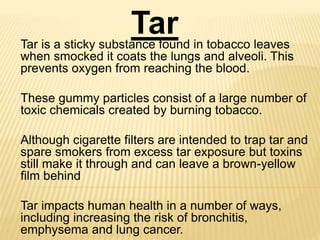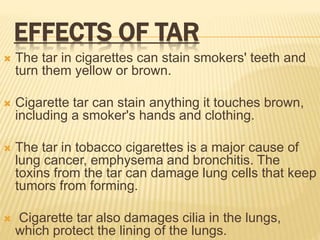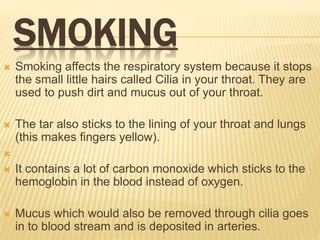Tar
- 1. Tar is a sticky substance found in tobacco leaves when smocked it coats the lungs and alveoli. This prevents oxygen from reaching the blood. These gummy particles consist of a large number of toxic chemicals created by burning tobacco. Although cigarette filters are intended to trap tar and spare smokers from excess tar exposure but toxins still make it through and can leave a brown-yellow film behind Tar impacts human health in a number of ways, including increasing the risk of bronchitis, emphysema and lung cancer. Tar
- 2. EFFECTS OF TAR ÔÉí The tar in cigarettes can stain smokers' teeth and turn them yellow or brown. ÔÉí Cigarette tar can stain anything it touches brown, including a smoker's hands and clothing. ÔÉí The tar in tobacco cigarettes is a major cause of lung cancer, emphysema and bronchitis. The toxins from the tar can damage lung cells that keep tumors from forming. ÔÉí Cigarette tar also damages cilia in the lungs, which protect the lining of the lungs.
- 4. BRONCHITIS ÔÉí Inflammation of the lining of the airways connecting the trachea to the lungs, called the bronchial tubes, occurs when the tissues become irritated. ÔÉí ÔÉí It becomes harder than normal to breathe, resulting in a consistent, hacking cough. ÔÉí Chronic bronchitis causes bronchial tubes to be red and swollen on a continuous basis and produce excessive mucus over time. ÔÉí Decreased immune system reactions may make killing off bacterial infections difficult.
- 5. EMPHYSEMA ÔÉí Emphysema develops when the air sacs at the base of tiny air passages called bronchioles gradually break down smoking. ÔÉí The irritating chemical in cigarette smoke tar is the leading cause of emphysema. ÔÉí Symptoms include shortness of breath, chest tightness, chronic coughing, fatigue and decreased physical activity ability. ÔÉí Emphysema eventually prevents oxygen entering the lungs from reaching the blood stream.
- 6. LUNG CANCER ÔÉí An increased risk of lung cancer correlates to the estimated total milligrams of tar from cigarette smoke to which a person is exposed. ÔÉí Lung cancer ranks as the leading cause of cancer deaths for Americans. ÔÉí Preventing or stopping the use of tobacco, including exposure to tar, could nearly eliminate lung cancer. ÔÉí If caught in an early stage, the five year relative survival rate for lung cancer is 31 percent.
- 7. SMOKING ÔÉí Smoking affects the respiratory system because it stops the small little hairs called Cilia in your throat. They are used to push dirt and mucus out of your throat. ÔÉí The tar also sticks to the lining of your throat and lungs (this makes fingers yellow). ÔÉí ÔÉí It contains a lot of carbon monoxide which sticks to the hemoglobin in the blood instead of oxygen. ÔÉí Mucus which would also be removed through cilia goes in to blood stream and is deposited in arteries.









